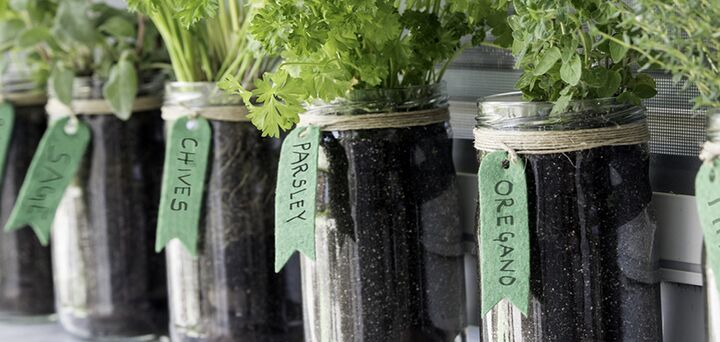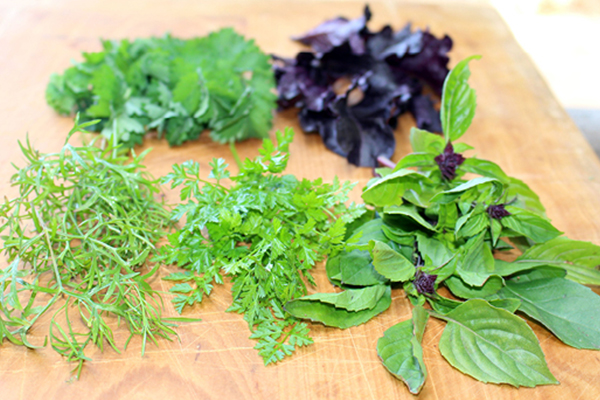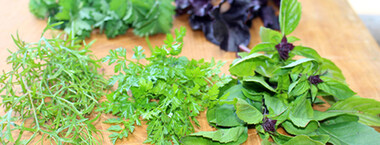
Spice up your meals with homegrown herbs. Read our top tips for growing your own groceries from horticulturist Marcelle Swanson.
Planting herbs is one of the simplest and easiest ways for you to start growing even the smallest part of your own food at home. And they’re a wonderful supplement to your pantry.
Spring is the ideal time to start a herb garden. Most herbs are available and will grow well in spring. They quickly settle into garden beds or into pots, planters and window boxes.
Perfect for small spaces, fresh herbs can turn simple dishes into gourmet creations and a basic salad into a culinary masterpiece.
If you're new to growing herbs, here are a few simple tips to get you started.
1. Grow perennial herbs for an extended harvest
Perennial herbs that can give you an abundant harvest all year include:
rosemary
thyme
oregano
sage.
Annual or seasonal herbs like basil and coriander will grow and die in a single season. These are great if you want to make pesto or preserve your herbs for use throughout the year.
2. Keep them close Growing herbs at home is thrifty and sustainable.
Growing herbs at home is thrifty and sustainable.
Grow your herbs in a convenient location, close to the kitchen or outdoor dining table. This makes regular picking easy. You could even recycle used glass jars and create make-shift pots for your window sill or sunny balcony. Thrifty and sustainable!
3. Plant in full sun
Most of our popular culinary herbs come from Mediterranean areas, so they thrive in full sun. They can tolerate periods of drought, and you should cut them regularly to stimulate fresh growth.
4. Grow what you use
When buying plants, it's easy to get lost in the moment and buy a range of herbs you wouldn't use. But it’s best to start with your culinary staples and expand from there. After all, growing herbs should help to cut costs too.
5. Herbs don’t need a dedicated garden There are many different herb varieties for you to grow.
There are many different herb varieties for you to grow.
You can plant herbs with other plants in garden beds. Many, like marjoram and thyme, are suitable as ground covers at the front of your garden. Sage and rosemary also enjoy a bit of group bonding and are suitable as foliage plants among perennials.
Back to basics with easy-to-grow herbs
Most herbs are very hardy, requiring a little water 2 to 3 times a week. Plus, an annual application of decomposed manure such as mulch in autumn or spring.
Potted herbs need watering more often, but this can be set up as an automated system if needed.
Whether you live in a home with a lush garden or an apartment with a sunny balcony, growing your own groceries is simpler than you think.
Written by Marcelle Swanson, Horticultural Communication Manager at The Diggers Club.
 Marcelle Swanson, Horticultural Communication Manager at The Diggers Club.
Marcelle Swanson, Horticultural Communication Manager at The Diggers Club.
As a member of The Diggers Club, you’ll get regular magazines, discounts on all plants, seeds and hardware, free entry to Diggers gardens and expert gardening advice. All while supporting the charitable work of the Diggers Foundation.
For more growing advice or to shop our range of mail-order herbs, visit The Diggers Club.
For more information about the lifestyle and support offered at our retirement villages, call our customer service team on 1800 550 550.
If you think your family or friends might enjoy this article, please share it with them.

- Plant in full sun: most of our popular culinary herbs have originated from Mediterranean areas, so they thrive in full sun, tolerate periods of drought and like to be cut regularly to stimulate new fresh growth.
- Grow what you use: when buying plants, it's easy to get lost in the moment and buy a range of herbs which you wouldn't normally use. Instead, start with your culinary staples and expand from there - after all, growing your own herbs should help to cut costs too.

- Herbs don't need a dedicated garden: herbs readily combine in garden beds with many suitable as ground covers at the front of your garden, like marjoram and thyme. Sage and rosemary also enjoy a bit of group bonding and are suitable as foliage plants among perennials.

Back to basics
Most herbs are very hardy, requiring a little water two-three times a week and an annual application of decomposed manure as mulch in autumn or spring.
Potted herbs will need more frequent watering, but this can be set up as an automated system off a nearby tap if needed.
Whether you live in a home with a lush garden or an apartment with a sunny balcony, growing your own groceries is simpler than you think.

This article was written by Marcelle Swanson, Horticultural Communication Manager at The Diggers Club.
For more growing advice or to shop our range of mail order herbs, visit diggers.com.au.
Diggers Club members receive regular magazines, discounts on all plants, seeds and hardware, free entry to Diggers gardens and expert gardening advice - all while supporting the charitable work of the Diggers Foundation.
Related Stories




